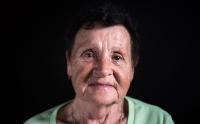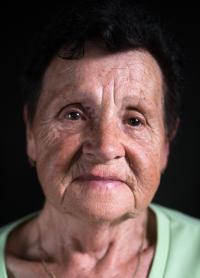One of the men who were moving us said: ´Take her with the pitchfork and throw her in, too!´

Download image
Mrs. Marie Čtvrtlíková (née Slunská) was born in 1938 in Frélichov (present-day Jevišovka) in a family of Moravian Croats. She was the middle one of three sisters, her father died as a German soldier and her mother thus became a widow when she was only twenty-nine. In 1949 the family was displaced to north Moravia to Huzová. Her mother’s father (Mate Šalamun) was a respected mayor of Frélichov in the First Republic era, and he was also one of the few Croats who managed to stay in the village even after 1948. Marie Čtvrtlíková talked Croatian to her mother till her death, now she speaks mostly Czech to her sisters. She lives in Bohuňovice.

